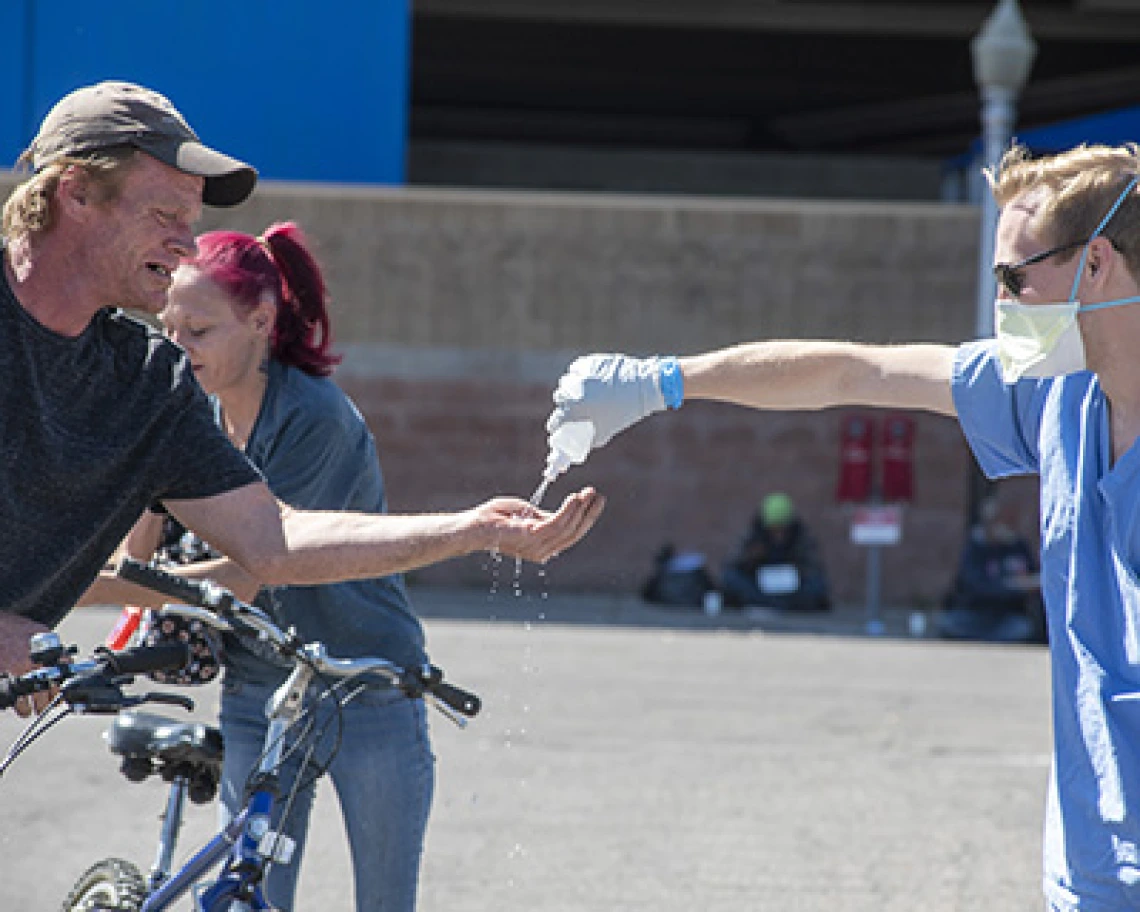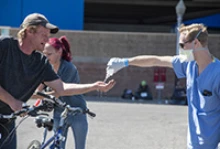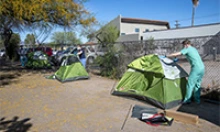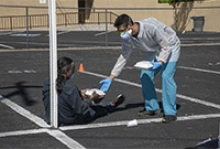UArizona Medical Students Rally to Help Tucson’s Homeless Amid Pandemic
Concerned about how the pandemic will impact the homeless population, University of Arizona Health Sciences students are screening Tucson’s homeless for symptoms of COVID-19.

TUCSON, Ariz. – Medical students at the University of Arizona College of Medicine – Tucson are stepping up to help Tucson’s homeless population amid concerns the population will be hit hard by COVID-19.

A volunteer provides hand sanitizer for a homeless man during a daily health status checkup April 5. University of Arizona College of Medicine – Tucson students are among volunteers checking on homeless people during the COVID-19 pandemic. The students are with Health for Homeless, one of the college’s Commitment to Underserved People programs. (Photo: The University of Arizona Health Sciences, Rick Kopstein)
“This is a vulnerable population in our community; they can’t defend themselves in a society already running short on supplies and resources,” said Christian Bergman, a UArizona medical student who will graduate in 2021.
To help, Bergman and fellow medical students are volunteering at Z Mansion, a popular downtown wedding venue that doubles as a soup kitchen for the homeless on Tuesdays, Thursdays and Sundays. The venue has seen a drop in the number of regular volunteers since the onslaught of the pandemic, Bergman said.
During each shift, students suit up in personal protective equipment, including gloves, medical masks and plastic face shields. Then, they prepare and serve meals, but also screen visitors — who are asked to remain 6 feet apart — for symptoms of COVID-19. Individuals with potential or suspected infection are isolated outdoors in tents on the property. These makeshift “wards” are staffed by UArizona medical students, who distribute food three times a day and monitor patients for worsening conditions.

University of Arizona medical students (from left to right: Christian Bergman, Erika Krall and Christopher Vance) build camping tents on the property of Z Mansion. The tents will serve as isolation units for homeless individuals who are suspected to have COVID-19. (Photo: The University of Arizona Health Sciences, Rick Kopstein)
The COVID-19 pandemic does not represent the first time UArizona medical students have volunteered at Z Mansion. Through Health for the Homeless, one of the college’s Commitment to Underserved People (CUP) programs, students regularly host clinics for the homeless alongside volunteer UArizona physicians. To reduce the risk of coronavirus transmission, the UArizona clinics are on temporary hold.
“Medical students feel it is their duty to assist in times like these,” said medical student Christopher Vance, who has volunteered at Z Mansion for the past six years. “We saw an opportunity to put our training to use and help our community.”

Medical student Christian Bergman distributes breakfast to a homeless man on Sunday, April 5. (Photo: The University of Arizona Health Sciences, Rick Kopstein)
Vance added, “We also would love to borrow large canopies to provide shade in the parking lot for the quarantine tents as the summer months approach.”
More information on the college’s activities regarding the COVID-19 pandemic are at this link.
The UArizona Health Sciences COVID-19 Resources webpage can be found here.
For the latest on the University of Arizona response to the novel coronavirus, visit the university's COVID-19 webpage.
# # #
NOTE: Photos available upon request.
About the University of Arizona College of Medicine – Tucson
The University of Arizona College of Medicine – Tucson is shaping the future of medicine through state-of-the-art medical education programs, groundbreaking research and advancements in patient care in Arizona and beyond. Founded in 1967, the college boasts more than 50 years of innovation, ranking among the top medical schools in the nation for research and primary care. Through the university's partnership with Banner Health, one of the largest nonprofit health care systems in the country, the college is leading the way in academic medicine. For more information, visit medicine.arizona.edu (Follow us: Facebook | Twitter | Instagram | LinkedIn).
About the University of Arizona Health Sciences
The University of Arizona Health Sciences is the statewide leader in biomedical research and health professions training. UArizona Health Sciences includes the Colleges of Medicine (Tucson and Phoenix), Nursing, Pharmacy, and the Mel and Enid Zuckerman College of Public Health, with main campus locations in Tucson and the Phoenix Biomedical Campus in downtown Phoenix. From these vantage points, Health Sciences reaches across the state of Arizona, the greater Southwest and around the world to provide next-generation education, research and outreach. A major economic engine, Health Sciences employs nearly 5,000 people, has approximately 4,000 students and 900 faculty members, and garners $200 million in research grants and contracts annually. For more information: uahs.arizona.edu (Follow us: Facebook | Twitter | YouTube | LinkedIn | Instagram).

